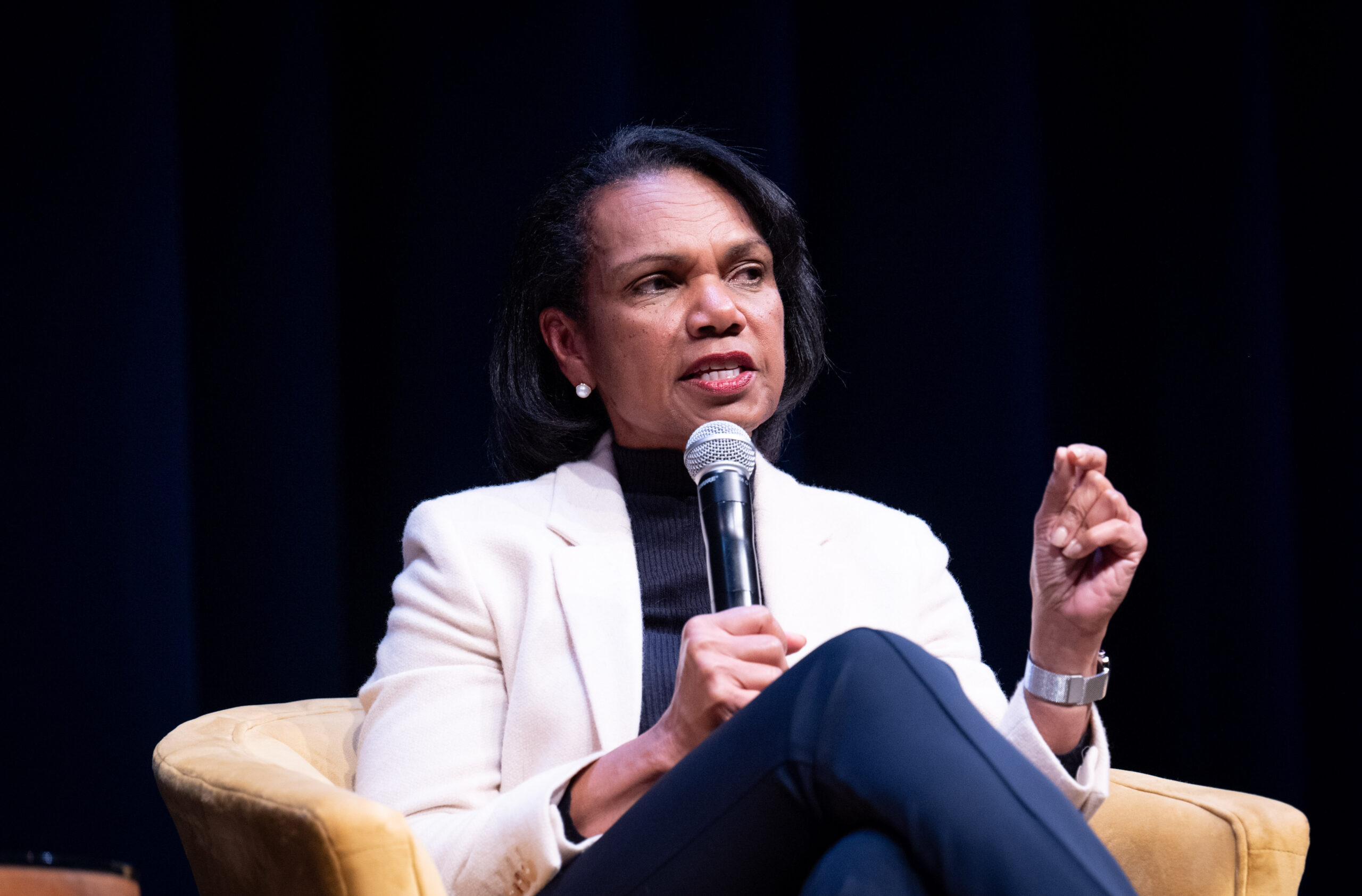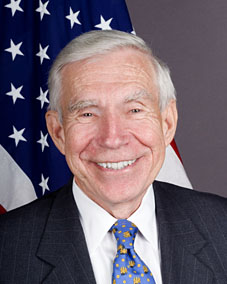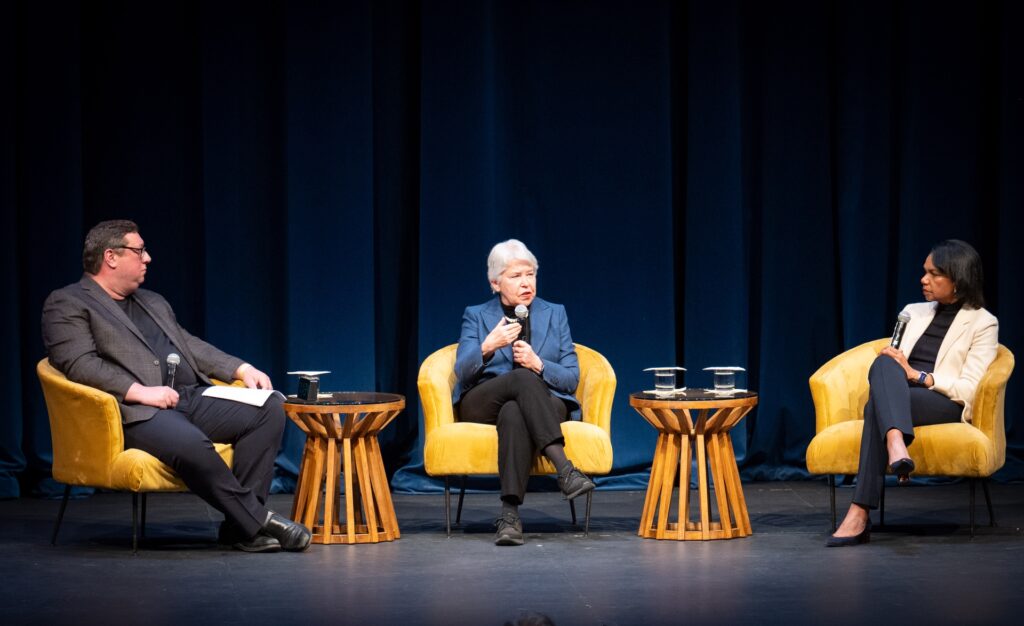How the Berkeley Liberty Initiative champions free speech in divided times
In a divisive election year and with tensions high on campuses nationwide, the BLI is beginning its next chapter under new program leadership and expanded outreach to students and faculty. It's also holding to its founding principles.

Keegan Houser/UC Berkeley
September 30, 2024
Over a decade ago, in the years leading up to UC Berkeley’s 50th anniversary commemoration of the Free Speech Movement, Frank E. Baxter led an effort to ensure that diversity of opinion remained a cornerstone of campus life.
Baxter, a Berkeley Social Sciences alum and former U.S. ambassador to Uruguay, wanted to create a space at Berkeley for dissenting voices to participate in the marketplace of ideas. To do so, he established what has since been named the Berkeley Liberty Initiative — a series of lectures and campus activities promoting freedom of thought and diversity of perspective.
As UC Berkeley now celebrates the 60th anniversary of the Free Speech Movement, the Berkeley Liberty Initiative remains a fundamental part of that marketplace. In a divisive election year and with tensions high on campuses nationwide, the BLI is beginning its next chapter under new program leadership and expanded outreach to students and faculty. It’s also holding to its founding principles.

“Freedom of speech is in the DNA of UC Berkeley,” Baxter said. “The BLI was formed to explore the potential of, and the challenges to, liberty at Berkeley and in the world at large.”
Those ideas are especially important in our highly polarized times. Differences of opinion affect almost every aspect of our world, from our relationships and career choices to our homes and education. College campuses, a stark reflection of these divisions in society, have been gathering places for protests across America, where tense battles over global affairs, domestic politics and identity have erupted in recent months.
“What I most appreciate about the BLI is its commitment to our foundational principles of thoughtful, open dialogue,” said Berkeley Social Sciences Dean Raka Ray. “The opportunity to encounter ideas that may be radically different from one’s own is central to our dual mission of teaching and research at UC Berkeley. The BLI demonstrates that that mission is alive and well in both the Travers Department of Political Science and the Social Science Division, and enables us to keep it so.”
What I most appreciate about the BLI is its commitment to our foundational principles of thoughtful, open dialogue.
Raka Ray, Dean of Berkeley Social Sciences
One of the BLI’s most prominent contributions to campus dialogue is the Ambassador Frank E. Baxter Lecture, an annual series that invites high-profile leaders to speak at UC Berkeley, broadening perspectives and sometimes spurring debate.
The lecture creates a platform for speakers with opposing viewpoints to hold respectful and informed intellectual discourse, where different opinions can be heard and understood.
Since the BLI’s inception, the lecture has featured a diverse array of speakers, each bringing unique insights into the ongoing conversation about liberty.
Past lecturers have covered everything from California’s cost of living to the future of the Republican Party. They have included intellectual scholars such as Jennifer Burns, Stanford history professor, Matthew Continetti, historian and author, and Lee E. Ohanian, UCLA economics professor.
This year’s talks have also tackled timely subjects. Keith Whittington, a Yale Law School politics professor, gave a lecture in May titled “Freedom of Thought and the Struggle to End Slavery,” which examined the connection between the abolition of slavery and free speech.
And in March, the BLI hosted a conversation between former U.S. Secretary of State Condoleezza Rice and recently retired UC Berkeley Chancellor Carol Christ. The event tackled the contentious topic of free speech in higher education. The lecture was met with both praise and controversy. People in the audience protested Rice’s role in the Bush administration and Christ’s involvement in the redevelopment of People’s Park.

Keegan Houser/UC Berkeley
Yet those disruptions made the crucial value of the BLI’s mission all the more apparent: to cultivate a campus culture where all voices can be heard without subjection to the heckler’s veto, even those that stir discomfort or dissent.
“The BLI exists to support open exchange of ideas. This is the animating spirit of the university, the reason for its special role in society, and a cherished tradition here at Berkeley,” said Sean Gailmard, a professor of political science and the BLI’s faculty director. “BLI events focus on the importance of, and potential challenges to, open dialogue. They present a range of perspectives that are not always featured in academic spaces.”
We want to help faculty as they develop students’ skills of expressing, hearing and understanding ideas — even potentially controversial ones.
Sean Gailmard, professor of political science
Those involved in the BLI say these lectures are more than just events — they are essential experiences that equip students with the tools to engage in these sometimes-difficult exchanges. Beyond the lecture hall, students have opportunities to discuss these ideas in more intimate settings, creating a deeper understanding of opposing viewpoints.
In the months and years ahead, the BLI plans to deepen student involvement by taking its events and projects directly into the classroom. As part of this vision, the BLI will work closely with faculty to understand and address the issues they encounter in their teaching, as well as strengthen the university’s connections beyond campus. The BLI plans to enhance its partnerships with organizations advocating for free expression like the Heterodox Academy, The American Enterprise Institute (AEI) and the Foundation for Individual Rights and Expression (FIRE) by holding more collaborative events for the campus community.
Over the last two years, UC Berkeley alumni have helped to define the BLI’s current expansion through their service on a task force. As a result, a group of committed alumni formed the BLI Founders Board, which will help the BLI expand and magnify its impact in its second decade so that it remains a force for free speech and intellectual diversity.
“We want to help faculty as they develop students’ skills of expressing, hearing and understanding ideas — even potentially controversial ones,” Gailmard said. “These skills are the infrastructure of open exchange, and faculty know we cannot take them for granted.”